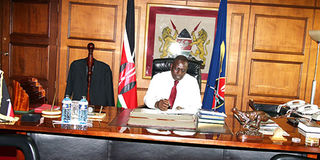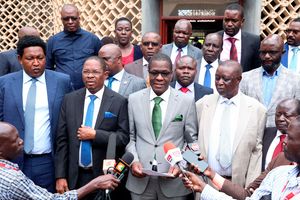Citizen Kenyatta’s euphoria inspiring symbolism

Deputy President William Ruto at Harambee House on October 7,2014 when he was acting president. President Kenyatta has been out of the country many times before in his young presidency but he does not tell Kenyans that the Deputy President will be in charge in his absence. FILE PHOTO | DPPS
What you need to know:
- A sitting president was to appear before ICC for the first time on Wednesday, October 8, 2014.
- On the campaign trail, candidate Kenyatta famously described his arraignment before ICC as a personal challenge.
- Buried and forgotten in their wall-to-wall coverage were the victims of the 2007 post-election violence.
Listening to MPs discuss the President’s speech to the joint Houses of Parliament before he went to the International Criminal Court (ICC), it was evident that opposition MPs were struggling to water down his decision to officially appoint Deputy President William Ruto acting president and surrender to him his office, limousine and motorcade.
True, President Kenyatta has been out of the country many times before in his young presidency.
But he does not tell Kenyans that the Deputy President will be in charge in his absence.
The reason could be that since it is known both men cannot be out of the country at the same time, the DP is automatically in charge when he is away.
Second, perhaps the President assumes all of us know that the constitution is self-executing, which means the DP becomes acting president immediately he exits Kenya’s borders.
Those who followed President Barack Obama’s first inauguration know he automatically became president at the constitutionally appointed time before he was sworn in.
The swearing-in came after the long festivities.
The American and Kenyan constitutions have left no room for a power vacuum at the top which is a good thing.
In Kenya, this gives dignity and power to the office of the DP while ensuring that not anybody can declare himself or herself acting president.
However, the circumstances under which the President was leaving the country were not ordinary.
They were of interest to Kenyans, Africans, the global human rights lobby, the United Nations and ICC itself and its watching supporters and detractors alike.
A sitting president was to appear before ICC for the first time on Wednesday, October 8, 2014.
The issue that arose, and which exercised many minds, was whether the President, by appearing at ICC, would be the face of Kenya and therefore put 40 million people on trial or whether he would be in the dock in his personal capacity.
On the campaign trail, candidate Kenyatta famously described his arraignment before ICC as a personal challenge.
However, on becoming President, Nairobi launched a massive campaign to persuade the African Union to lobby State Parties to introduce a change to the Rome Statute to bar a sitting president from appearing before ICC until after his or her term.
The argument was simply that circumstances had changed and candidate Kenyatta was now President Kenyatta.
Opposition legislators, sensing an opportunity to force the President on the back foot, were quick to remind him that he was faced with a personal challenge and should not drag the twin Houses of Parliament into things personal. They delighted in his discomfiture.
This is where symbolism comes in. None can doubt the power of symbolism in power politics.
Yes, the constitution is self-executing and, yes, the President has been out of the country before, but a populist symbol had to be found to give special meaning to this exit and return, capture the moment dramatically and ingrain it in millions of minds.
The image would also have to put the opposition in the shade and send out a powerful message that there was, indeed, a difference between candidate Kenyatta and President Kenyatta and that President Kenyatta could also become Citizen Kenyatta.
That symbol needed to remind all that it was Citizen Kenyatta on trial and not the people he leads.
It looks so simple after the act, but it cannot have been.
It took serious thinking and debating, toing and froing, scratching of heads, reading and re-reading of the law, identifying and then weighing the pros and cons and the best and worst case scenarios and, eventually, arriving at decisions from which to choose and laying these before the President.
So the President decided: I will not only hand over power, but will be seen to be doing so.
I will transform into a citizen and be seen as such at airports and on the planes.
On coming back, I will be welcomed with pomp and circumstance.
I will not only have faced my ICC tormentors, but also dwarfed my political opponents.
So the President exploited ICC, which many thought would be his waterloo, to once again wrong foot his opponents.
He shored up his political stock as a brave man who leads by brave example.
Even the media were sucked into the euphoria-inspiring symbolism of Citizen Kenyatta.
Buried and forgotten in their wall-to-wall coverage were the victims of the 2007 post-election violence.
Opanga is a media consultant; [email protected]





